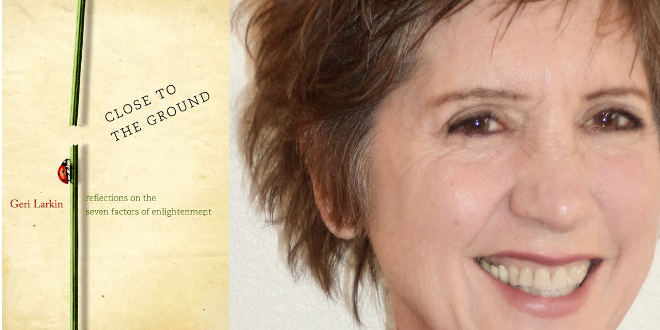Close to the Ground; reflections on the seven factors of enlightenment
by Geri Larkin
2013 Rodmell Press, Berkeley, California
177 pages
If you enjoy a bit of modern American female memoir with your Pali Canon you will enjoy Close to the Ground, and hopefully find a nugget or two to reflect upon and use in your own zen practice. I sought to review this book because Geri Larkin was a Dharma Wheel turner for me many years ago. Her 1997 book, Stumbling Toward Enlightenment, was a message in a bottle at a time when I was questioning the values and compromises of working in a corporate office environment. Intrigued by the title, I picked up her book. It was the nudge I needed to resign and embark on creating my own small business as a yoga instructor. Stumbling Toward Enlightenment was about the Eight Fold Path and Larkin’s personal experiences, struggles and views. The book illustrated the way those teachings were useful.
In her new book Close To The Ground, Larkin uses Dharma talks she has offered on the Buddha’s “seven factors of enlightenment” as her new focus for refining zen practice. These seven factors of enlightenment are Shakyamuni Buddha’s teachings from the Pali canon. Larkin’s life circumstances have changed during the past 25 years, but it feels like she is the same person I knew from Stumbling Toward Enlightenment — yet older and wiser.
“An American drawn to the Dharma, Larkin is willing to disclose many of her personal difficulties, entering spiritual practice in a foreign tradition with foreign-born teachers.” Larkin began her Buddhist studies with Ven. Samu Sunim, a Korean-born Buddhist monk who completed his Zen training under Master Solbong Sunim at Pomo-Sa Monastery, in Pusan, Korea. Samu Sunim is the founder of the Buddhist Society for Compassionate Wisdom, which has five Zen Buddhist Temples in Ann Arbor, Chicago, New York, Toronto and Mexico City.
Larkin trained at Maitreya Buddhist Seminary and was priest ordained as P’arang in July 1995. She lived at the Ann Arbor temple and served as a Dharma Teacher there until she decided to leave to found a new temple in 1999, the Still Point Zen Buddhist Temple, in Detroit, Michigan. She has authored seven books on the Dharma including an interpretation of the Dhammapada (sayings of the Buddha).
Many years after leaving the temple she helped to found, Larkin offers us practical teachings for living in the world as we find it, using the seven factors of enlightenment. These factors make up the chapter titles for her new book: Mindfulness, The investigation of phenomena, Energetic effort, Ease, Joy, Concentration and Equanimity.
Whether relating time spent with her grandson, or encounters with strangers in the local coffee house, Larkin successfully bridges the Buddha’s teachings from 2500 years ago to 21st century America. I found her frankness refreshing. And her everyday experiences, as expressed and understood, are often profoundly moving.
Each chapter has four to six Dharma lessons. Here are a few of my favorites: Buddha is grass shoes, Beau explores a ladybug, Fear as a best friend, Racing to the door. On the factor of concentration Larkin says that cooking is a great practice to develop the muscles of concentration. And she includes three useful and delicious recipes for feeding people on retreat.
The central theme I came away from the collection of talks with is to “lean in” to whatever one is experiencing. In sighting examples of connecting to a son in a twelve step program, dealing with a chronic health issues and answering the front door, Larkin wants us to learn to lean in, investigate, concentrate, focus, and experience joy, ease and equanimity. If this book has any weakness it is the sometimes jagged transitions from one Dharma talk to another within the same chapter.
I found parts of the book humorous, sweetly clear in message and true to the author’s politics and to her unique voice. Some of her stories are sobering and profound.
When she says “Investigation of phenomena is a permanent get-out-of boredom-hell-free card.” we get the feisty encouraging free thinker voice of experience that spurs and directs us with clarity.
Recalling a lesson about the factor joy she relates this funny story ; “Sometimes Sunim would catch me mid-disaster and say, “P’arang, you are Buddha.” For a long time I thought he was saying, “You are Bob”. I wondered who Bob was and whether he ever made it through the torture of the seminary. Then I read the Lotus Sutra and realized that he had been saying Buddha, not Bob.” Here Larkin’s signals us to see the reality of confusion in practice situations. And kindly ask us to relate to the lessons and humor we gain from looking back at those moments.
“Leaning in” has become a buzz word in the American business world since Sheryl Sandberg’s book, Lean In: Women, Work, and the Will to Lead. Close to the Ground’s use of the phrase is not about the ambition promoted by the former, but about being completely in the moment with intensity and absorption and thus deepening and steadying ones Buddhist practice.
With Larkin’s instruction I do find myself saying “lean in to this.” Whatever “this” happens to be at the moment. Whether cooking dinner for my husband after an exhausting day, or driving an injured friend to appointments, or shopping. Leaning in to the experience makes it richer and allows me to tap into a root of zen practice, no-matter what I am doing or where I find myself. I end up closer to the ground and it feels very powerful.
That strong take away and practice alone was worth the read. And I know this will be a pleasant companion to take with me and reread on vacation, or to reflect back on to when I need a touch of inspiration for a practice discussion topic, or just a push in my personal practice. P’arang Geri Larkin feels like a beloved, feisty auntie who isn’t perfect, but whom I trust all the more because of it.

